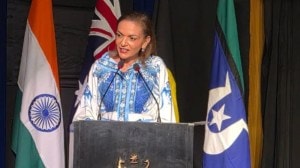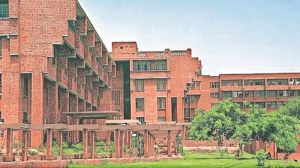How Baghdad doctors secured their hospital for patients
After 35 years of money-grubbing rule by Saddam Hussein and his cronies, the doctors and staff at the Saddam Teaching Hospital for Children ...

After 35 years of money-grubbing rule by Saddam Hussein and his cronies, the doctors and staff at the Saddam Teaching Hospital for Children eagerly hope for a new government to bring some accountability to public life. But they’re not waiting for it. Last week, doctors won a quiet revolution.
They forced the hospital’s director and accounting chief to surrender their authority because of what the doctors said were years of corruption in which the administrators sluiced hospital funds to their private use. The doctors forced a cut in patient fees, for years unaffordable for many Iraqis.
The US military occupies Iraq but does not govern it. In the absence of administration, policing and courts, Iraqis are beginning a spontaneous reform of Saddam’s public institutions. A move against Saddam-era administrators seems to have begun in the hospitals because they were the only institutions that have been open amid the war and the spasm of looting.
Doctors reported a similar mutiny against the director of Al-Noor Hospital in Baghdad. Saddam Teaching Hospital is one of the city’s most prestigious, with 700 beds, more than 1,200 staffers and a modern building. But at the height of the looting, it barely functioned. The hospital lacked water and sufficient electricity. Most staffers could not reach it, and exhausted surgeons worked without sleep.
One of the surgeons was the director. ‘‘Dr. Hakam A. Mohammed,’’ he said, introducing himself to visiting journalists without using his family name, Nasri. Under Saddam, he used it readily. The Nasri family is from Saddam’s hometown of Tikrit and the two families have been closely entwined. Many of Saddam’s top military and security officials were Nasris.
In a reflection of Mohammed’s connections, the doctors said, Saddam’s physicians moved the dictator’s personal medical equipment from his palace and hid it in the section of Saddam Teaching Hospital that includes Mohammed’s office. Only Mohammed has the key, they said. Doctors said Mohammed embezzled amounts that likely ran into hundreds of thousands of dollars. Mohammed agreed that corruption at hospitals had been a problem under Saddam, but said it ‘‘didn’t happen here.’’ Pressed for family origin, he said he was from Tikrit, but claimed to be a Naimi, not a Nasri, and unrelated to Saddam’s family.
However, in a quiet, nervous conversation, two hospital staffers who deal with finance and administration — one of them from the accounting department — confirmed the corruption.
Mohammed and allies routinely ‘‘inflated the cost of things,’’ said the accountant. ‘‘If they bought (something) for 1,000 dinars, they would record that it cost 20,000 and they would keep the 19,000.’’
The revolution began during the looting of Baghdad, when a group of doctors went to the main mosque in the district, al-Kadhimiya, to ask help in recruiting volunteer security guards for the hospital. With the hospital gates suddenly supervised by armed men he could not control, Mohammed tried to get US troops to take over and send them away. Army tanks showed up for a few days, but left the gates to the volunteers.
At the mosque, ‘‘we explained the problem of the director’’ to one of the senior clerics, Sheikh Ali Wa’idh, said Dr. Issam Khleif Mutayer, a senior resident. Wa’idh ‘‘said we had to oppose the director in a peaceful way. He said … (the director) is a surgeon and the Iraqi people need surgeons. So we must negotiate with him.’’ The doctors presented their demands to Mohammed. They included an end to high fees for patients, transfer of the chief accountant, ne practices to halt embezzlement, and a leave of absence for Mohammed during which the reforms would be instituted. If he refused, the doctors had support from the sheikh and armed guards at the gates — enough muscle to oust Mohammed outright.
On Wednesday, the hospital administration told staff and visitors that Mohammed was beginning ‘‘a two-week vacation’’ because of illness. But unexpectedly, he showed up. He was suffering high blood pressure, he said, and had just stopped by for a moment. He was not interested in speaking directly about the struggle at the hospital, but he conceded that the fall of the Saddam government is forcing some changes on him. And he laid out his defence. He had worked hard to keep the hospital running during the war and to protect it from looters, he said. Mohammed clearly hopes to keep his job. ‘‘I must work as well as I can’’ in the interests of the hospital, he said. ‘‘If I work badly, they will want to change me’’. (LA Times-Washington Post)



- 01
- 02
- 03
- 04
- 05




























